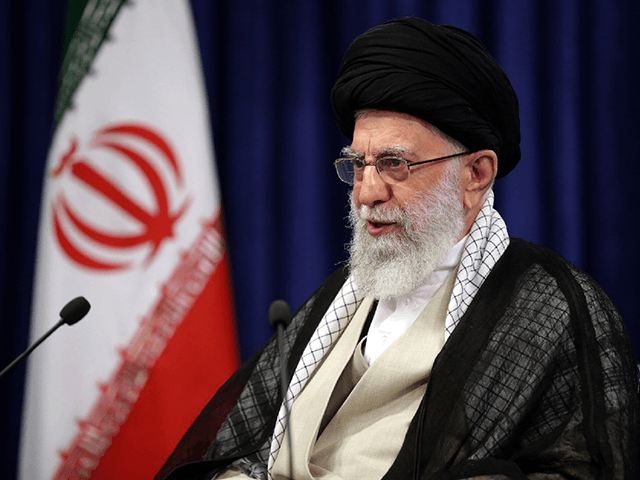Iranian advocacy group Iranian Americans for Liberty (IAL) called for unity against Iran after releasing a statement blasting the Islamic regime’s presence on U.S.-based social media platforms while banning its citizens from that same access, and calling for legislation to ban all Iranian regime officials from the platforms.
In an exclusive statement made to Breitbart News on Sunday, Iranian Americans for Liberty (IAL) Executive Director Bryan E. Leib urged lawmakers on both sides of the aisle to join forces to bar the theocratic regime’s leadership from exploiting social media platforms for their own ambitions.
“The Iranian Americans for Liberty calls on Democrats and Republicans in the U.S. House of Representatives to work together to draft bipartisan legislation targeting all Islamic Republic regime officials from utilizing U.S.-based social media platforms such as Twitter, Facebook and Instagram,” Leib said.
Noting the damaging “misinformation” pushed by the Islamic regime, Leib highlighted Iran’s practice of banning its own citizens from use of such outlets.
“Regime officials have shown us time and time again that they utilize their platforms to spread misinformation and to spew their hatred for the United States of America and our ally, the State of Israel,” he said.
“Congress should work in a bi-partisan manner to ban all Islamic Republic regime officials and affiliates from having access to the very platforms that they ban their own citizens from using,” he added.
In a statement released Friday, IAL called for the sweeping legislation after deeming the demand to ban Iran’s Supreme Leader Ayatollah Ali Khamenei from Twitter by U.S.-based journalist and activist Masih Alinejad, who is of Iranian descent and is an outspoken critic of the Tehran government, “too narrow of a target.”
“The [Islamic Republic regime] in its entirety, and all its officials and affiliates should not have access to US based internet technology,” the statement read.
“We are confident that we have the support of House Republicans for a resolution to ban access to US based internet platforms by [Islamic Republic regime] officials and its affiliates,” it continued, as it called to work together to support the resolution.
“We hope that despite our disagreements, we can work together to bring an end to the use of US based technology by the [Islamic Republic regime] to propagate its hateful message,” it concluded.
Social media networks such as Twitter have been criticized for banning conservative voices including then-President Donald Trump and, more recently, Rep. Marjorie Taylor Greene (R-GA) — who has one of the largest followings on social media of any Republican member of Congress, while prominent individuals and groups accused of spreading disinformation and explicitly calling for violence remain free to use the platform, including hostile foreign powers.
Iranian officials have often expressed hateful and threatening rhetoric towards both the United States and Israel, often through social media platforms.
Last month, the Iranian government-controlled Islamic Republic of Iran’s Twitter account posted an image warning of its capability of attacking all of Israel, cautioning, “Just try and you will see,” as part of its relentless campaign aimed at taunting the Jewish state and threatening its existence.
Just try and you will see
פשוט תנסה ותראה pic.twitter.com/FpZBHwj9aq— إيران بالعربية (@iraninarabic_ir) December 17, 2021
In September, Iranian Armed Forces Spokesman Brigadier-General Abolfazl Shekarchi cast the United States as the Iranian republic’s top enemy while describing his country’s commitment to the elimination of Israel.
The recent call to bar Iranian officials from social media platforms comes amid heightened tensions between Iran and the West over failing nuclear deal negotiations, as President Joe Biden and his administration have attempted to renew the Iran nuclear deal of 2015, which offered Iran sanctions relief in return for promises not to enrich uranium beyond a certain level, though only for a limited period.
Iran, the largest state sponsor of terrorism worldwide, claims its nuclear program is for energy purposes but world leaders, including the six nations that joined the 2015 deal to limit Iran’s nuclear weapons capacity, say enriching uranium may lead to Iran’s ability to quickly create a nuclear weapon.
The Obama-led nuclear deal — deemed fatally flawed and highly one-sided by many, and from which then-President Donald Trump withdrew in 2018 — delineates an enrichment limit of 3.67 percent.
Iran has been accused of violating the agreement as Tehran produces more enriched uranium.
Recently, the International Atomic Energy Agency told member nations in its confidential quarterly report that Iran has an estimated stock of 39 pounds of uranium enriched to up to 60 percent fissile purity, an increase of almost eight kilograms since August.
Nevertheless, current nuclear talks in Vienna may see the United States and other world powers provide Iran with economic sanctions relief in exchange for temporary restrictions on its nuclear program.
In October, U.S. special envoy for Iran Robert Malley warned that Iran successfully achieving nuclear capabilities in the near future is a realistic scenario.
“We have to prepare for a world … where Iran doesn’t have constraints on its nuclear program,” he said, adding that options are being considered to “deal with” such a scenario even as the Biden administration seeks a return to the Iran deal.
Rep. Mo Brooks (R-AL), along with Republican colleagues, blasted President Biden and his administration for displaying weakness in its relations with Iran, having “inexplicably” removed sanctions from Iranian missile producers, and for “empowering” terrorists.
With an eye on nuclear weapons and through the support of terrorist organizations such as Hezbollah, Hamas, the Palestinian Islamic Jihad, and the Houthis in Yemen, Iran continues to be a growing global threat to the interests of many countries.
Follow Joshua Klein on Twitter @JoshuaKlein.

COMMENTS
Please let us know if you're having issues with commenting.